Every Thursday, the members of the Alternative Television and Film Club meet to work on becoming the "antithesis of corporate television."
Some are working toward the dream of breaking into the film industry, and, for others, Alt-TV is more of a hobby. Whatever the reason for joining, the members are there to learn how to become better at film and TV outside of the broadcast spectrum.
The club, which was started in 2012 by John Pinto, is now headed by Kyle Fisher, Keith Sutterfield and Dain Miller, all of whom are also senior communication studies majors.
Each week, the group of approximately 18 members puts on a production meeting, in which they brainstorm ideas, write scripts, shoot and edit film. Members are then welcome to present their work to the group for critiques and feedback. The club also hosts training seminars in various softwares, like Adobe After Effects, Premiere Pro and Celtx, and general production skills, like lighting and audio management.
After these months of working to produce content, the end of every semester is capped off with a public screening at Top of the Roc. The members' films are edited into a 30 to 45 minute continuous video, like a television show. Scott Walus, the group's advisor, says it's the students' time to show off what they've learned and created.
"It's really great to have that communal moment you might not get at home watching YouTube," he said.
Eventually, Fisher said, the group would like to get enough content to have a 30-minute spot on WEIU. For now, the group is working on honing their skills and someday creating longer pieces that will last roughly five to 10 minutes each.
No matter the length of the film, the works created for Alt-TV are meant both for portfolios and just for practice.
All of this could seem overwhelming to a student who has no prior exposure to any aspect of film or television production. Dr. Walus said that shouldn't be an issue, though, because Alt-TV is a way for both beginners and more advanced students to get a better grip on the ins and outs of media.
This kind of limitless creative environment is how members of Alt-TV can transform from students learning the process of film and TV to actual producers, Walus continued. Even if the final product isn't perfect, this is a way participants can recognize any errors, learn from them, and do a better job the next time.
"You take chances, you make mistakes and you go, 'Oh, well this is a fantastic mistake when I made it,'" said Walus.
People new to the group may have no experience, but Walus said by the end of the semester, they're more comfortable with their technical and production skills, and sometimes they are forced to move outside their comfort zone. Right now, no group member is focusing specifically on writing scripts, which forces each participant to move beyond production and get the full gamut of the creation process.
"We write, we direct and we edit," Fisher said. "We get all that practice."
Alt-TV meets at 6 p.m. every Thursday in Coleman 1781.




